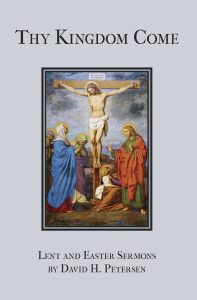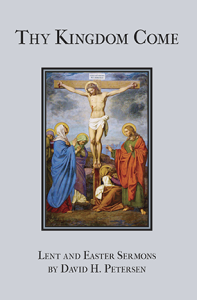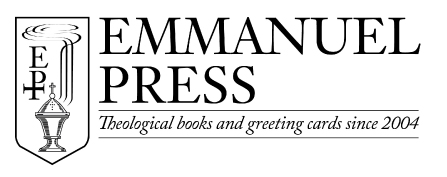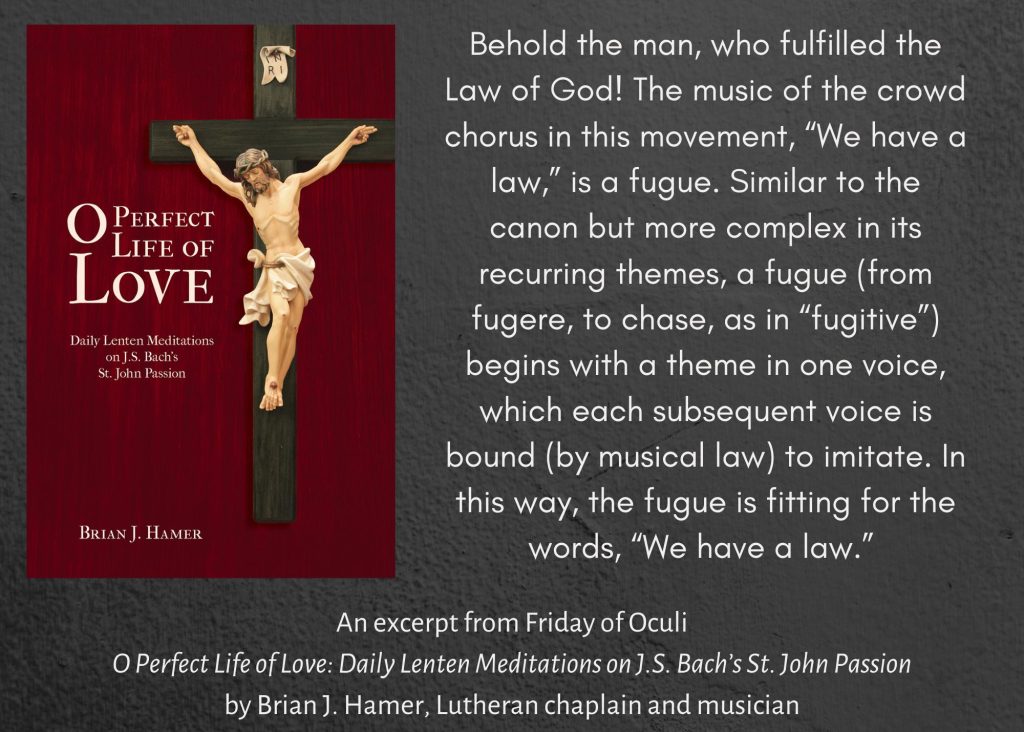THE LATEST NEWS
Anointed with Ashes
 An excerpt from Thy Kingdom Come: Lent and Easter Sermons by David H. Petersen
An excerpt from Thy Kingdom Come: Lent and Easter Sermons by David H. Petersen
“Your ashes are smeared today. There is no beauty in them. The world cannot see anything in them but an ugly smudge of dirt and death. But for those with the eyes of faith, they are in the form of a cross, that most lovely and dear of all symbols, that emblem of our hope.
“We set our faces toward Jerusalem today. We turn our backs on sin. We look through the gallows on Golgotha and see the glory of the cross enlightening the empty tomb. He has been lifted up from the earth to draw us to Him, to drain the Law’s accusing power, to empty hell’s claim, to crush the devil’s head, to bestow peace upon the meek.
“You are a holy people, anointed with ashes. You belong to the Lord. His mark and name are upon you. This is what it is to be sanctified, to be holy. You are forgiven, to be sure, but there is more than that. You are not only forgiven, or just made even with God, as though you never did anything wrong, and that is that. There is more. For not only has your debt been wiped out, but there is a credit to your account. You aren’t just even; you are holy. You belong to Him. You have the superabundance of His good works counting as your own, and the earth, indeed all of the universe, is your inheritance.
“So remember that you are dust and that you will return to dust. But remember also that God is a man, dust like you, joined to your temptations and sorrow, welded to your death, who was roasted to death in the Father’s wrath, reduced to ashes, and laid to rest in God’s good acre as a ransom, a whole burnt offering. That man is risen again from the dead and has come forth from the earth like a plant in the spring, that He would be your God. Turn your back on sin. Turn toward the Lord and His mercy. For here is peace and joy. Here is hope and faith.”
O Perfect Life of Love: Daily Lenten Meditations on J.S. Bach’s St. John Passion
Thy Kingdom Come: An Excerpt from Septuagesima
 “The main point of the parable is that entrance into the kingdom comes by grace. The workers are rewarded for work they did not perform. This is hardly a surprise to us; in fact, we practically expect it.
“The main point of the parable is that entrance into the kingdom comes by grace. The workers are rewarded for work they did not perform. This is hardly a surprise to us; in fact, we practically expect it.
“G.K. Chesterton once said, ‘Do not be proud of the fact that your grandmother was shocked at something which you are accustomed to seeing or hearing without being shocked…It may be that your grandmother was an extremely lively and vital animal and that you are a paralytic.’
“Chesterton has in mind immoral things. He means, ‘Don’t think you are more sophisticated than your grandmother because you watch television shows full of vulgarities and aren’t bothered by them. It could be that she was highly intelligent and sensitive and you have been paralyzed by evil so much that you don’t even notice it.’
“The same sort of numbness applies to the Gospel as well. I fear that it is even worse. We’re not just numb, but we’ve crossed over the line drawn by Bonhoeffer into ‘cheap grace.’ I fear we’re now guilty of thinking grace is worse than cheap; it is a right, an entitlement, as though God owed us salvation. Repent.”
–These are the first 4 paragraphs from the sermon for Septuagesima, based on Matthew 20:1-16. Find Thy Kingdom Come here.
Passion-Book: Judas Makes a Traitorous Pact
But then entered Satan into Judas, named Iscariot, being of the number of the Twelve. And he went his way and communed with the chief priests and captains, that he might betray Him, and said, What will ye give me? I will deliver Him unto you. When they heard it, they were glad. And they covenanted with him for thirty pieces of silver, and he promised. And from that time he sought opportunity to betray Him without rumor.
Matthew 26:13–16; Mark 14:10–11; Luke 22:3–6
O Judas, is this the reward for the faithfulness and benefits that Christ showed thee? For a handful of coins thou sellest the One who is to be prized higher than heaven and earth? Woe to thee! This deed shall be to thy hurt in body and soul!
Here from this terrible deed of Judas’ let every man learn, first, how the devil is such a powerful enemy, who stirs up and drives men to sin, and that “he that committeth sin is of the devil” (1 John 3:8). Therefore we are to resist him, steadfast in the faith. Second, that covetousness is a root of all evil. Behold, Judas lets himself be so taken in by the insatiable devil of covetousness that he betrays his own Lord and Master, who is the Son of God and whose glory he has seen with the other disciples, for thirty pieces of silver. For because the damnable love of money brings great harm, and at the same time ill-gotten goods are kept in a purse full of holes, therefore let every Christian keep himself from this vice, and pray daily with David: O Lord, “incline my heart unto Thy testimonies, and not to covetousness” (Psalm 119:36). Third, let it be learned that many people in the world, out of sheer vainglory and greed for money, hatred and envy, and other in ordinate affects, bring themselves and others into all manner of mischief, sorrow, and misery, and lose their life and limb, yea, even their salvation. For because Judas saw that by the anointing of Christ here, a goodly sum had slipped through his fingers, and that he could not attain to worldly honor and great riches with Christ and His Gospel, he sought every opportunity to be rid of Christ, to take revenge on Him, and to obtain great honor, money, and goods with the chief rulers of Jerusalem. Therefore he offered to betray Christ.
This was a bitter suffering for the Lord Christ. But He left us a pattern, that we should walk in His steps and imitate Him and suffer with patience when we have done all good to others and afterward are betrayed and sold and brought into sorrow and misery by them. Chrysostom, the doctor of the church, the veritable “Goldenmouth,” had with him a deacon by the name of Severianus, a hypocritical babbler, whom he sometimes caused to preach for him and did him every good at the court of Emperor Arcadius. But afterward, the Empress Eudoxia made so much of this abominable hypocrite that he despised his preceptor and finally drove him into exile and misery, in which the holy man died in the year after the death of Arcadius.
But see that the Lord Christ is the true Joseph, who is sold by his own brothers, as Zechariah prophesied (Zech. 11:12–13). He is sold and betrayed for our sake. It cost a great deal to redeem our souls, for God’s only Son Himself is the Ransom, yet He is appraised at only thirty pieces of silver. But it was so resolved that He who was counted as nothing before the world should count a great deal before His heavenly Father, and His death should be a plentiful payment for the sins of the children of men.
_______
An excerpt from Passion-Book by Friedrich Lochner, edited and translated by Matthew Carver, Devotion 5
Comfort in Sorrow

The Word Remains is a collection of excerpts comes from Wilhelm Löhe’s extensive writing on mission, pastoral theology, history, and liturgy. Originally published in German in 2008, this English translation of a delightful book that gathers his profound wisdom into one small volume, offering devotional reading on the church year, the Word of God, and matters related to the Christian life: faith, prayer, fellowship, worship, creation, and hope.

Let’s stay in touch! To receive the most current information on our products and new releases, join our email list today!



